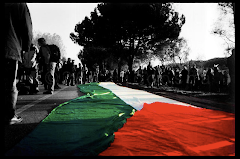Both the below articles were taken from PRESSTV (http://www.presstv.ir). I think they are a clear example of the Israeli policy, as outlined by Dov Weisglass - adviser to Olmert - in 2006, "The idea is to put the Palestinians on a diet, but not to make them die of hunger."
Israel denies Gaza access to clean water
Israel has refused to allow a French-made water purification system into Gaza amid a drinking water crisis in the Palestinian strip.
The French Foreign Ministry said Friday that Tel Aviv had blocked the entry of a much-needed water purification station into Gaza and had forced its repatriation.
Ministry of Foreign Affairs spokesman Eric Chevallier said the move has sparked an outcry in the Elysée, prompting it to summon the Israeli ambassador to Paris to explain why the system was denied access.
"There were a very great number of steps taken at all levels to try to get the water purification station into Gaza," he said, adding that Israel's explanation was not satisfactory.
The United Nations Office for the Coordination of Humanitarian Affairs recently warned that Israel's 23-day onslaught on Gaza has pushed its sewage system on the brink of collapse and thus increased risks of groundwater contamination in the Palestinian territory.
"The most dangerous thing is the contamination of drinking water with sewage. We need an international organization like the World Health Organization to investigate the matter," said Monther Shoblak, head of the Coastal Municipalities Water Utility (CMWU).
According to the UN, Israel's three week-long saturation bombing of the Palestinian territory has seriously damaged pipes and has left drinking water in very short supply.
Warning of the serious public health risks, the World Bank has urged the Israeli government to allow enough fuel into Gaza to operate some 170 water and sewage pumps there.
The bank called on Israel to allow maintenance crews to shore up a sewage lake in northern Gaza before it overflows at the expense of the 1.5 million Palestinians living in the area.
UN warns of acute food crisis in Gaza
The United Nations says Gazans face an acute food crisis and accelerating rates of malnutrition as a result of the war on the territory.
The UN Food and Agriculture Organization (FAO) said Friday that Israel's offensive into Gaza has taken a heavy toll on the territory's agriculture sector and has heightened risks of food insecurity and undernourishment.
"Almost all of Gaza's 13,000 families who depend on farming, herding and fishing have suffered damage to their assets during the recent conflict and many farms have been completely destroyed," reads a statement by the FAO.
The Rome-based FAO asserted that the 1.5 million population of Gaza are suffering from an acute shortage of nutritious, locally-produced and affordable food. "Meat and animal protein is generally unavailable," it added.
"Food supplies were already running low in Gaza due to the closing of its borders in the 18 months prior to the Israeli military offensive," the FAO continued.
According to relief workers, the humanitarian situation in the impoverished strip is at its worst with over 1.1 million people -- about 75 percent of the residents of Gaza -- dependent on food aid.
This comes as the United Nations Office for the Coordination of Humanitarian Affairs recently warned of a looming drinking water crisis in the Palestinian territory as a result of attacks on the aging water pipes in the strip.
According to the office, drinking water in Gaza is scarce as Israel has pushed the Gaza sewage system to the brink of collapse and has thus increased risks of groundwater contamination.
"The most dangerous thing is the contamination of drinking water with sewage. We need an international organization like the World Health Organization to investigate the matter," said Monther Shoblak, head of the Coastal Municipalities Water Utility (CMWU).
The military operations on Gaza came at a time when Palestinians were already suffering from an 18-month blockade, which stripped the area of vital goods, including food, fuel, medical supplies and construction materials.










No comments:
Post a Comment